Search
Showing 10 of 1867 results for how to register international groups
-
Welcoming Michael Zhang to Team China
Michael brings to the role 10 years of experience as a New Zealand diplomat. Throughout his professional career he has had a strong focus on China and an extensive record of working in the international education market in China. Having served as Acting Consul-General in Guangzhou and Deputy Consul-General in Chengdu, Michael has a deep understanding of the operating context in China.
Combined with his expertise in Chinese language and culture, Michael brings a highly valuable skillset at a critical time for the international education sector, says Lisa Futschek, GM International at ENZ.
“We will be very sorry to farewell Miranda Herbert, who has been with us since June 2019, but it’s exciting to have another highly qualified person for this important role,” Ms Futschek says.
Michael will undertake an induction programme in ENZ’s Wellington office from 5 September 2022 before visiting key international education providers in New Zealand, as well as NZ Inc agencies. He will relocate to Beijing from the end of September, for a three-week handover with Miranda and the ENZ team on the ground.
-
Prime Minister welcomes international students
One of many welcome events around the country since our borders reopened at the end of July, the ceremony was attended by more than 70 students, as well as representatives of UoA and Education New Zealand Manapou ki te Ao (ENZ). It was an emotional moment for some of the students, who had been waiting a long time for the opportunity to study here.
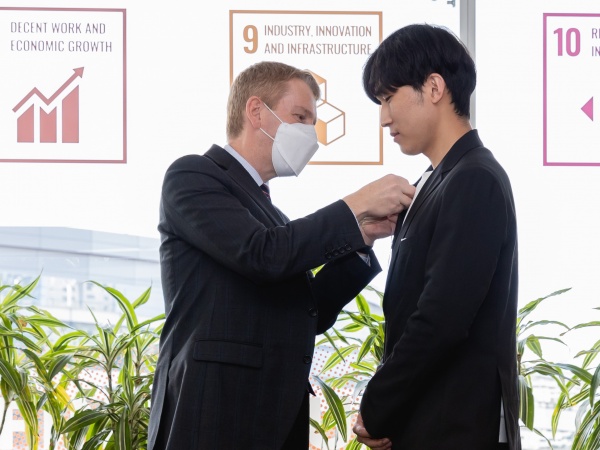
Minister Hipkins presenting a Tū Ngātahi pin to international student Kyeongmin Kang from English Language Academy
Tū Ngātahi pins were presented to international students Petchpiangpor Sueasuwan from Western Springs College; Kyeongmin Kang from English Language Academy; and Ankeeta Karmakar from UoA by the Prime Minister, Minister Hipkins and UoA Vice-Chancellor, Professor Dawn Freshwater respectively.
ENZ Chief Executive Grant McPherson explained the significance of the Tū Ngātahi pins, which you can read more about here.
The formal welcome was followed by morning tea, with further exchanges of Tū Ngātahi pins and opportunities for photographs.
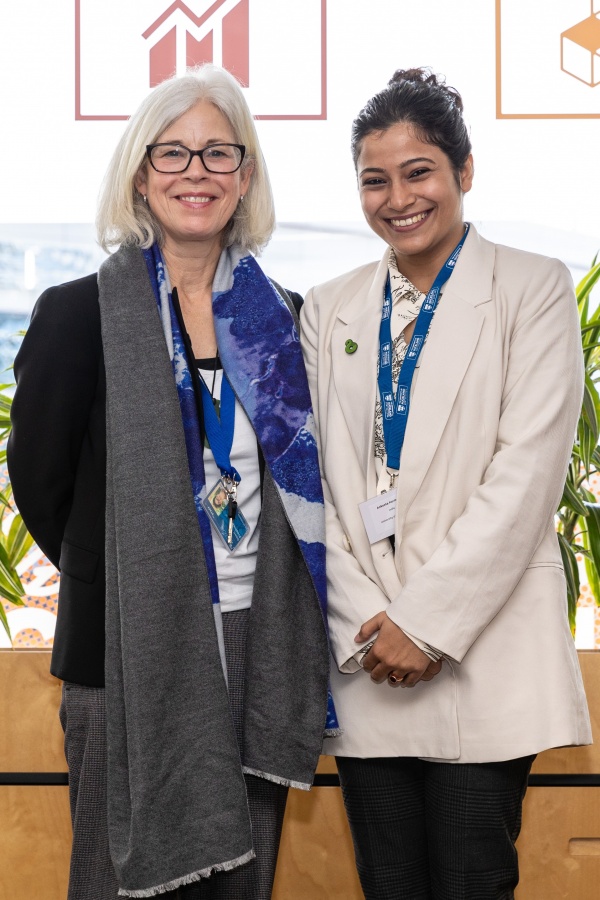
Professor Dawn Freshwater, Vice-Chancellor at University of Auckland, with university student Ankeeta Karmakar.
International student Malina Grube from the University of Auckland spoke about her experiences here, and her involvement in the kākahu project.
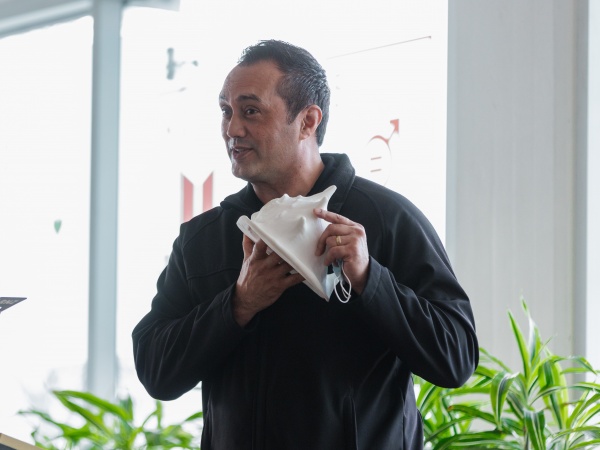
Michael Steedman, Kaiarataki at the University of Auckland, demonstrated a 3D-printed conch shell as part of his welcome to guests – a metaphor for new arrivals and new opportunities.
-
Connecting careers in Bay of Plenty and Waikato
This new online resource hub supports international secondary school students to pursue tertiary education and employment opportunities in the regions.
Secondary schools can use the tool to showcase the exciting range of opportunities in the students’ backyard. It encourages them to explore, plan, connect and succeed.
International students staying in the regions bring many benefits, including addressing skill shortages in key industries where skilled workers are in high demand, increased spending and promoting global citizenship and diversity.
Education Tauranga regional relationship manager Melissa Gillingham says providing a comprehensive international student journey plan is becoming increasingly important.
“This allows students and their parents to see the opportunities that exist in the regions, from the school sector, into the tertiary sector and through to employment,” she says.
“Excellent existing relationships across all education sectors within our region allowed us to hit the ground running, creating, delivering and promoting our international student journey plan. We would like to thank all our stakeholders for their support.”
Education Tauranga partnered with Education New Zealand Manapou ki te Ao, Te Waka and Rotorua NZ to help bring Career Connect to life.
-
Education links with China
Lisa Futschek, General Manager, International, at Education New Zealand Manapou ki te Ao (ENZ) says the Joint Working Group has become an important mechanism for supporting educational cooperation and exchange with China.
“It’s a valuable opportunity for government agencies and education sector representatives from both countries to exchange ideas and information and build relationships.”.
This is the second time the Joint Working Group has been held virtually. Senior officials and subject matter experts from both New Zealand and China’s education and government sectors came together to discuss topics of mutual interest including higher education, early childhood education, vocational education and applied learning, and quality assurance.
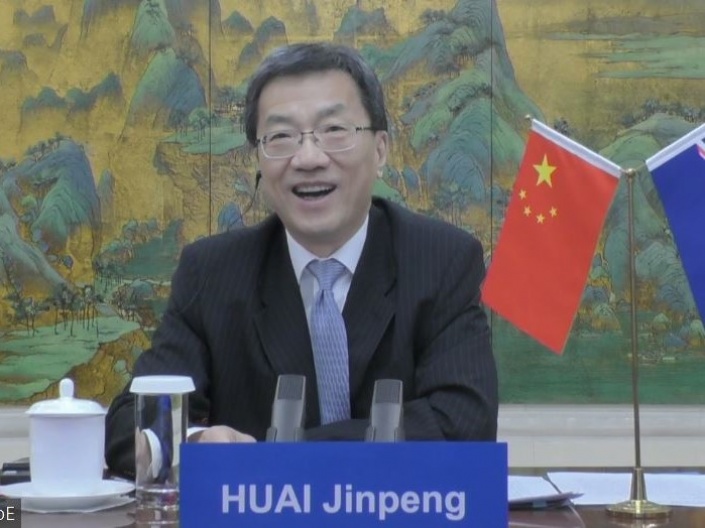
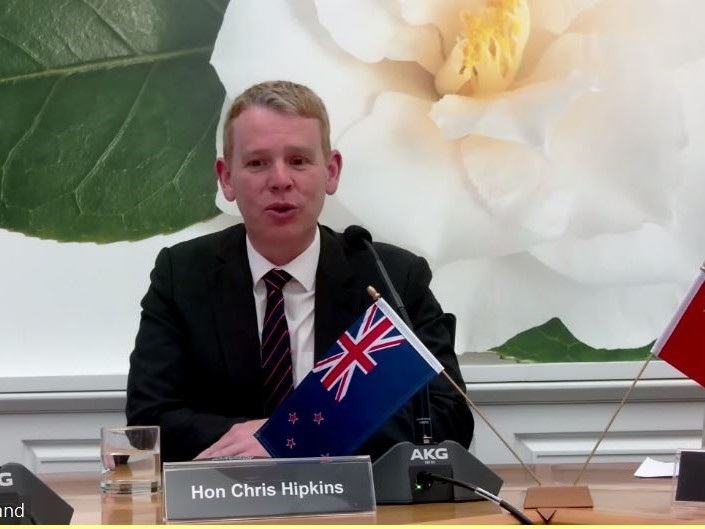
Jinpeng Huai, Minister of Education, People’s Republic of China and Hon Chris Hipkins, Minister of Education, New Zealand exchanged remarks at the Opening of the 10th Joint Working Group
The meeting saw the renewal of the Addendum to the New Zealand – China Arrangement on Cooperation in Education and Training, which covers a range of joint projects including the New Zealand-China Tripartite Partnership Programme. Note: the 2023 New Zealand-China Tripartite Fund is currently open for proposals from New Zealand university representatives.
Secretary for Education and Chief Executive, Ministry of Education of New Zealand, Iona Holsted and Vice Minister, Ministry of Education of People’s Republic of China, Xuejun Tian, renewed the Addendum to the New Zealand – China Arrangement on Cooperation in Education and Training.
The meeting also provided an opportunity for New Zealand representatives to provide updates on collaboration with China in the areas of Vocational Education, Higher Education, and Quality Assurance.
David Christiansen, ITP Transition Lead, Te Pūkenga, shared the newly-launched International Strategy and the development of international collaboration and opportunities internationally and in particular with China.
“We wish to renew and strengthen our existing offshore collaborations and create new collaborations. New Zealand has many areas of strength, across a range of industries, where we believe we can offer value and strength to Chinese Industry,” Mr Christiansen said.
There are currently 41 degree or diploma joint programmes across more than 14 subjects from engineering and fashion to viticulture and winemaking, and agriculture. These partnerships cover 20-plus provinces and numerous cities throughout China.
The fifth New Zealand China Higher Education Forum, co-hosted by Universities New Zealand and China Education Association for International Exchange was held virtually on 10 November 2022 and was a discussion topic for the JWG during the Higher Education discussion. Chris Whelan, Chief Executive of Universities New Zealand, was present at the fourth New Zealand-China Higher Education Forum held in Beijing in 2015. He told participants that, back then, “the focus was on how to deepen collaboration between our institutions, how to grow mutual student mobility, and how to ensure high-quality education offerings.” It is evident the New Zealand-China education relationship in the higher education sector has developed over the years to envelop broader current topics such as “green and sustainable development of higher education,” building on the foundation established through years of cooperation.
The final discussion topic, Quality Assurance, saw Alex Bidois from New Zealand Qualifications Authority (NZQA) provide an update on the progress of the working group on the Recognition of Distance Learning Qualifications between NZQA and the China Service Centre for Scholarly Exchange. The working group was established at the ninth Joint Working Group and NZQA has been working with its partner agency to lay a foundation to build towards mutual recognition of distance learning qualifications.
-
International students welcomed across New Zealand
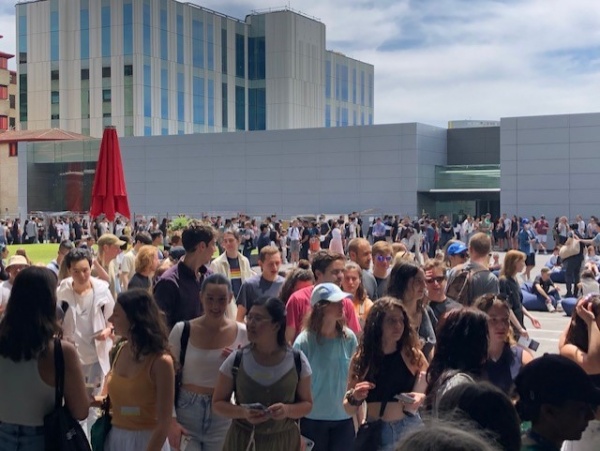
In February, hundreds of international students gathered at a University of Auckland orientation event. ENZ’s Student Experience Manager, Ross Crosson, says, “The wait, for many, has been long but there was a very positive vibe in the air.”
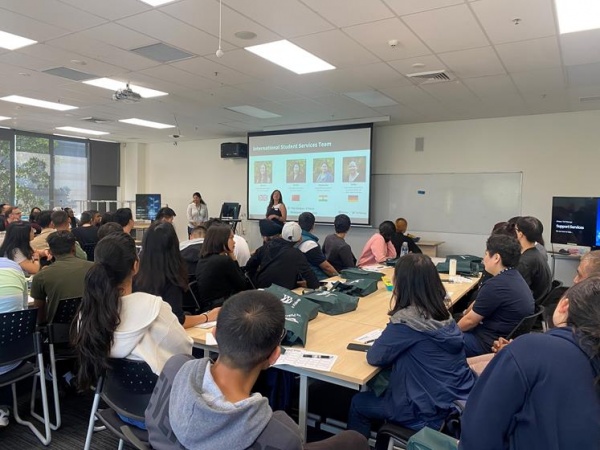
In Hamilton, the Wintec | Te Pūkenga International student services team held an interactive event to welcome students on campus. They used a range of activities to create connections amongst the students and to familiarise them with student support services available.
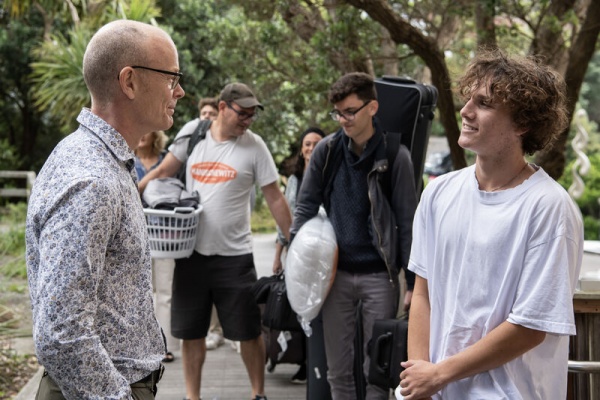
Over in Wellington, Victoria University of Wellington Vice Chancellor Nic Smith took the opportunity to connect with students face-to-face as they were settling into halls of residence.
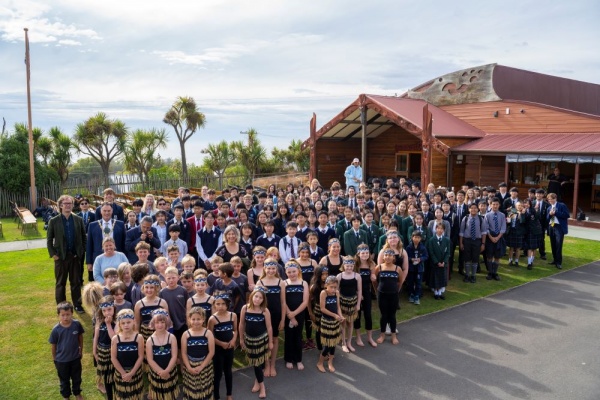
More than 150 international students from 11 local secondary schools were welcomed into Dunedin at Puketeraki Marae on 8 March. In the event organised by Enterprise Dunedin and Kāti Huirapa Rūnaka ki Puketeraki, the guests spent the morning at the pōwhiri, which was accompanied by pupils from Waitati School kapa haka group, and then enjoyed a kōrero and some kai.
-
Call for speakers for NZIEC KI TUA 2023
NZIEC KI TUA 2023 will be held in Ōtautahi Christchurch from 16 to 18 August 2023 at Te Pae Convention Centre. A welcome function will occur on Wednesday evening followed by two days of conference sessions on Thursday and Friday.
2023 marks the 30th time our conference will be held, and this year’s theme is Te Ara Ki Tua – the pathway ahead. As we celebrate this milestone, our theme encourages us to consider how our sector can thrive in the future.
We’re calling for speakers to help us explore the following sub-themes:
- Excellent Experiences – How can we foster excellent experiences for international students studying with Aotearoa New Zealand?
- Marketing Smarts – What are the most effective ways to market to and recruit international students?
- Growing Global – How can we grow our relationships with international partners?
- Authentically Aotearoa – How can our international education offerings tap into what makes our country special?
- Fresh Offerings – How can we develop fresh programmes, products, services and partnerships and take them to the world?
Please refer to the NZIEC KI TUA website here for detailed information on the theme and sub-themes, session formats, tips for your abstract and biography, and speaker terms and conditions.
You can submit your speaking proposal through the NZIEC KI TUA Speaker Portal. Submissions close on 22 May 2023.
If you have any questions, please contact us at nziec@enz.govt.nz.
We hope you will consider joining us at NZIEC KI TUA to discuss the key opportunities and challenges facing our sector as we discuss Te Ara Ki Tua.
An in-person format and early bird registration
Subject to pandemic settings, this year’s conference will be an in-person format. Sector feedback revealed a strong desire to return in-person, in part to facilitate kanohi-ki-te-kanohi connections after so many years apart.
We are not intending to offer a hybrid option (in-person and virtual format) this year as this requires additional resources to deliver and a hybrid approach results in inferior experiences for both audiences. To support attendance, and in recognition of the impact of Covid-19, a discounted early bird registration rate will be available this year.
- Excellent Experiences – How can we foster excellent experiences for international students studying with Aotearoa New Zealand?
-
From the CE: Our focus for the next 12 months
Kia ora tātou,
"To help providers of international education to build back onshore offerings" is Focus Area One of the New Zealand International Education Strategy. There are nine key short-term actions in Focus Area One. Education New Zealand Manapou ki te Ao is the lead Government agency in four actions and has an important role to play in eight of the nine. It can be no surprise then that for the next 12 months, and our next financial year starting in June, that the majority of ENZ's energy, time and resources will be focused on attracting learners to study with New Zealand.
This is no small challenge. Our borders have been open now for just eight months. And while students are returning, the latest visa application numbers I've seen report in the order of 43,000 applications (offshore and onshore), the recovery is variable at best. Even within the university sector, that on the face of it looks to have recovered better than others, the experience is mixed. Within the PTEs and English Language schools we have a long way to go to reach the levels of 2019 and early 2020. In such a highly competitive market, it is going to take some time to regain awareness with learners and overcome the head start other countries gained.
All our budgets are tight. At the very time we need to be investing and getting offshore to renew partnerships and networks, we are all resource-constrained and having to watch every cent. ENZ is no exception.
This means that for the next 12 months, more than ever, we need to focus. We need to focus our limited resources to where they have the greatest impact, and we need to be aligned as one with the sector.
India is an excellent example of a partner market that is worthy of focus. I have just returned from leading an ENZ delegation to India. India is forecasting economic growth of 6-7% every year for the next three to five years. They know, and their national education strategy makes it clear, they need educated, skilled and talented people to realise this opportunity. I repeatedly heard, "They want their people back".
That five Deputy Vice Chancellors joined the 23 sector representatives tells you how important India is. As one of the five said to me, "India today is what China was 15 years ago".
To be successful we need to agree that India is important. It is. We need to go there together. We will. We also need to work with our colleagues in other Government agencies to ensure they are aligned. This is what success looks like for me. And this is the level of focus on building back, and the level of partnership with the sector, that I expect from my ENZ teams over the next 12 months.
I will also work with them to secure the many gains we have made in government-to-government relationships, scholarships, diversity, equity, and inclusion, social licence, and in building a sustainable future. All the good work of the past two years remains important for the long-term future, set out in Focus Area Two: Building a new future for international education.
We are all very passionate about international education and its ability to transform lives. In 2023/24 when the sector is stronger than today, all of us will be better placed to address the short term and the medium to long term. Today our focus must be the immediate needs.
He moana pukepuke e ekengia e te waka
A choppy sea can be navigated
This proverb acknowledges the changing and challenging environment that we currently find ourselves in and how it can be navigated by collaboration and innovation.
Ngā mihi nui,
Grant McPherson
-
Around the world in five
United Kingdom
British Council examines future of English language learning
English will remain the world’s most widely spoken language over the next decade driven by employment and higher education trends, and teachers will continue to be at the heart of learning despite the rise of AI and automation, according to a new publication by the British Council.
United States
New forecast warns that US is falling behind in the global race for talent
A new HolonIQ analysis focused on the US and its competitive position relative to other leading study abroad destinations finds that within the total global international education market, the US is losing share of foreign students to Australia, Canada, and the UK.
Canada
Dalhousie University - New study abroad course takes 14 Indigenous students to Aotearoa-New Zealand
A group of Indigenous students from Dalhousie have embarked on a two-week study tour of New Zealand that will transport them deep into the country's rich Māori history and culture.
India
Dishonest players in India are 'damaging' industry reputation
Education counsellors across India say duplicitous players in the international education market are having a seriously negative impact on the sector, with one senior counsellor describing the situation as “supremely unethical”.
Netherlands
Netherlands outlines plans to control international student flows
The Dutch education minister has written to universities to outline plans for controlling international student numbers, including a central management system, tools for ministerial intervention, strengthening of the Dutch language and targeted instruments on programmes to control flows.
-
NZ strengthens education ties in North America
The visit was an opportunity to form relationships with international ministerial counterparts and key stakeholders, lead and participate in policy dialogue, and promote understanding of Aotearoa New Zealand’s education system and reforms.
Minister Tinetti began her action-packed week of engagements in Ottawa, Canada where she hosted a round table lunch on international indigenous education at the New Zealand Official Residence. This was attended by Patty Hadju, Minister of Indigenous Services and representatives from Indigenous Services Canada, the Canadian Commission for UNESCO, the Canadian Ministry of Education, the Canadian Bureau of International Education, and Global Affairs Canada.
In between formal engagements, Minister Tinetti took time to visit York Street Public School where, as a former teacher and Principal, she enjoyed connecting with local students and teachers.
Following a busy few days in Canada, Minister Tinetti and her delegation moved on to Washington D.C for the International Summit on the Teaching Profession (ISTP). The ITSP conference brings together 22 countries to discuss how to strengthen the teaching profession and ensure all students have access to quality education.
ENZ’s Director of Engagement, Americas, Middle East and Europe, Dubois Jennings said Minister Tinetti made it clear that New Zealand valued the potential opportunities for mutually beneficial collaboration, and her interest in developing these relationships.
“Minister Tinetti used her time at ISTP to make important connections with other countries, several senior US education officials and experts in specific areas of interest for New Zealand. Those interests include national policies around compulsory education, teacher training, professional development, higher education and vocational training” he said.
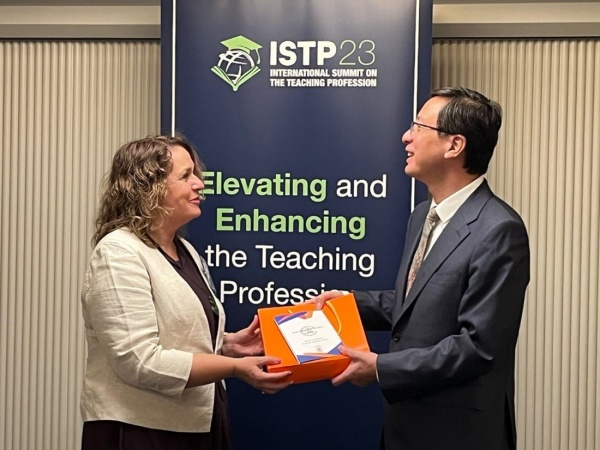
Minister Tinetti with China Education Vice Chancellor Chen Jie
Whilst in Washington D.C, Minister Tinetti also met with China Vice Minister of Education, Chen Jie. This bilateral meeting between New Zealand and China adds to the list of engagements at the Ministerial and Officials level over the past few months adding value to the strong education relationship between our two countries.
Later in the week Minister Tinetti attended the ANZAC Dawn Service where she had the opportunity to meet with Australia's Minister for Education Jason Clare.

Left: Assistant Secretary, Bureau of Educational and Cultural Affairs Lee Satterfield and Minister Tinetti at the US Department of State.
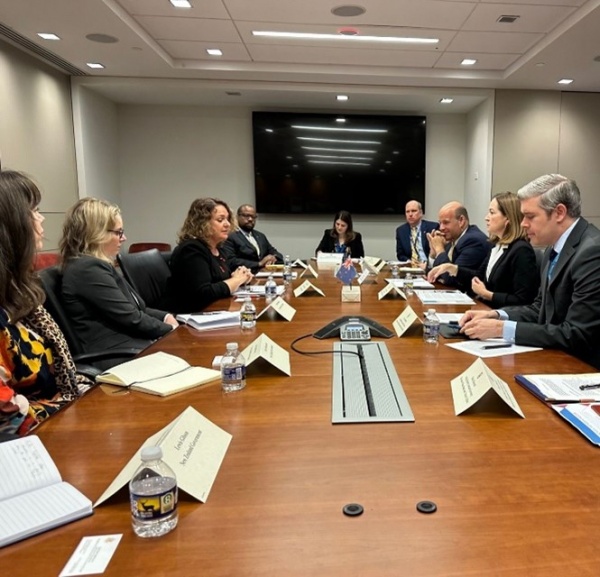
Minister Tinetti meeting with US officials at the Department of State
-
Tribute to a longtime friend of New Zealand
Education New Zealand Manapou ki te Ao (ENZ) would like to share a tribute to the memory of KC Yong, Chairman of SELSET Education, Malaysia, particularly to his tremendous contribution over a lifetime to growing the education relationship between New Zealand and Malaysia.
KC – as he was fondly known – first connected with New Zealand as an international student studying engineering at the University of Auckland. His experience studying and living in the country left him with a deep, lifelong appreciation for New Zealand education.
It was likely this close connection to New Zealand that led KC to set up SELSET Education, a pioneer New Zealand specialist education consultancy in 2002. Over the past 21 years, KC’s efforts have seen SELSET grow to become the largest Malaysia-based education agency recruiting international students for New Zealand.
ENZ’s Regional Director – Asia, Ben Burrowes, said it was a real privilege to have known and worked with KC, who was so passionate about New Zealand education.
“KC and his son Rick – as well as their extended family who work for SELSET – have held close working relationships with our international education sector for decades. KC’s passing is a huge loss. I would like to personally acknowledge his immense contribution to the education relationship between New Zealand and Malaysia over the last few decades.”
ENZ’s Acting Market Manager – Malaysia and Indonesia, Naluri Bella, also recalls her association with KC Yong and SELSET Education.
“KC was a pioneer in the international education space for Malaysia and will certainly be missed. His legacy lives on in his family and team at SELSET Education.”

